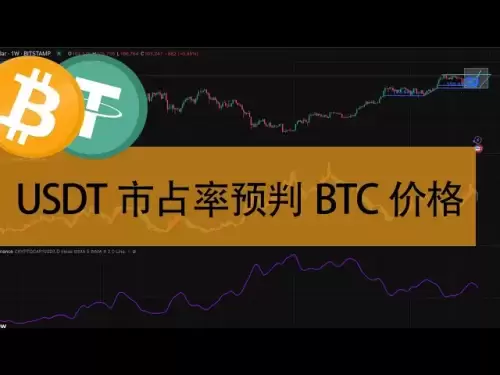-
 Bitcoin
Bitcoin $103,961.0257
0.46% -
 Ethereum
Ethereum $2,519.1161
1.30% -
 Tether USDt
Tether USDt $1.0002
0.00% -
 XRP
XRP $2.3995
1.16% -
 BNB
BNB $647.8555
0.87% -
 Solana
Solana $171.3965
1.71% -
 USDC
USDC $0.9998
0.00% -
 Dogecoin
Dogecoin $0.2245
3.85% -
 Cardano
Cardano $0.7620
-1.33% -
 TRON
TRON $0.2730
1.67% -
 Sui
Sui $3.8319
0.87% -
 Chainlink
Chainlink $15.8425
3.01% -
 Avalanche
Avalanche $23.2963
2.14% -
 Stellar
Stellar $0.2924
0.93% -
 Hyperliquid
Hyperliquid $26.9465
1.05% -
 Shiba Inu
Shiba Inu $0.0...01479
3.96% -
 Hedera
Hedera $0.1953
0.96% -
 UNUS SED LEO
UNUS SED LEO $8.7156
-2.40% -
 Bitcoin Cash
Bitcoin Cash $400.9790
1.32% -
 Toncoin
Toncoin $3.1177
1.78% -
 Polkadot
Polkadot $4.7925
1.68% -
 Litecoin
Litecoin $98.9493
-1.77% -
 Monero
Monero $344.3506
1.77% -
 Bitget Token
Bitget Token $5.1439
2.85% -
 Pepe
Pepe $0.0...01326
6.99% -
 Pi
Pi $0.7584
10.22% -
 Dai
Dai $1.0000
0.00% -
 Ethena USDe
Ethena USDe $1.0006
-0.02% -
 Bittensor
Bittensor $431.8051
2.85% -
 Uniswap
Uniswap $6.0300
2.68%
Is Ethereum ETF worth buying? What is the return?
Ethereum ETFs offer exposure to Ethereum's price without direct ownership, but returns are influenced by market sentiment, regulations, and network developments.
May 18, 2025 at 10:42 am
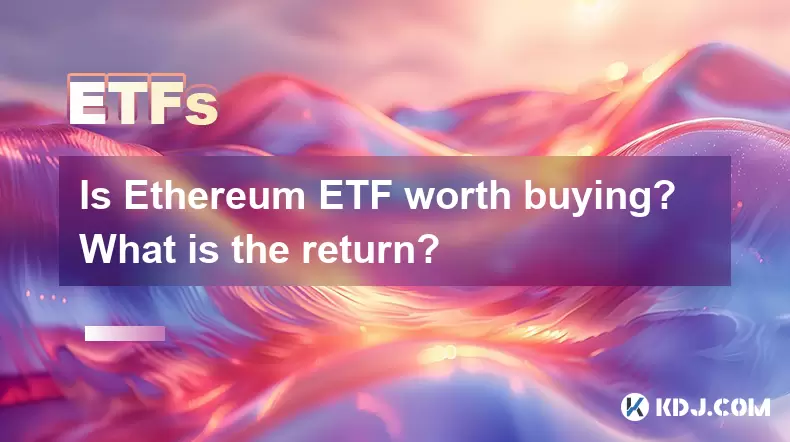
Is Ethereum ETF worth buying? What is the return?
The question of whether an Ethereum ETF is worth buying and what kind of returns it might offer is a complex one that requires a deep dive into the nature of Ethereum ETFs, their performance, and the factors that influence their returns. Let's explore this topic in detail.
Understanding Ethereum ETFs
An Ethereum ETF, or Exchange-Traded Fund, is a type of investment vehicle that tracks the price of Ethereum, the second-largest cryptocurrency by market capitalization. Ethereum ETFs allow investors to gain exposure to Ethereum without the need to directly purchase and store the cryptocurrency. These funds are traded on traditional stock exchanges, making them more accessible to investors who are familiar with stock market trading but hesitant to venture into the crypto space.
Types of Ethereum ETFs
There are primarily two types of Ethereum ETFs: physically-backed ETFs and futures-based ETFs. Physically-backed ETFs hold actual Ethereum in their portfolios, while futures-based ETFs invest in futures contracts that derive their value from the price of Ethereum. Each type has its own set of advantages and risks.
Physically-backed ETFs offer direct exposure to Ethereum's price movements. They are considered more straightforward because they hold the actual asset. However, they come with the challenges of custody and security of the underlying Ethereum.
Futures-based ETFs do not hold Ethereum directly but instead invest in futures contracts. These ETFs can be more complex due to the nature of futures markets, but they can also provide a way to gain exposure to Ethereum without the need for direct custody.
Factors Influencing Ethereum ETF Returns
Several factors can influence the returns of an Ethereum ETF:
Market Sentiment: The overall sentiment towards cryptocurrencies, and Ethereum in particular, can significantly impact the price of Ethereum and, consequently, the performance of an Ethereum ETF.
Regulatory Environment: Changes in regulations related to cryptocurrencies can affect the demand and supply of Ethereum, thereby influencing ETF returns.
Ethereum Network Developments: Upgrades and improvements to the Ethereum network, such as the transition to Ethereum 2.0, can impact the value of Ethereum and the performance of related ETFs.
Economic Factors: Broader economic conditions, such as inflation rates and monetary policy, can also play a role in the performance of Ethereum ETFs.
Historical Performance of Ethereum ETFs
To understand the potential returns of an Ethereum ETF, it's helpful to look at the historical performance of existing ETFs. For instance, the ProShares Bitcoin Strategy ETF (BITO), which is a futures-based ETF, has provided investors with a way to gain exposure to Bitcoin, and similar ETFs for Ethereum have been proposed and launched.
Volatility: Ethereum is known for its high volatility, which can lead to significant gains or losses. For example, in 2021, Ethereum's price surged from around $730 in January to over $4,000 by May, before experiencing a sharp correction.
Returns: The returns of an Ethereum ETF would closely follow the price movements of Ethereum. If Ethereum's price increases by 50% over a year, an ETF tracking Ethereum would likely see similar gains, minus any fees and expenses.
Risks Associated with Ethereum ETFs
Investing in an Ethereum ETF comes with several risks that investors should be aware of:
Market Risk: The cryptocurrency market is highly volatile, and Ethereum is no exception. This volatility can lead to significant fluctuations in the value of an Ethereum ETF.
Regulatory Risk: The regulatory landscape for cryptocurrencies is still evolving. Changes in regulations could impact the viability and performance of Ethereum ETFs.
Liquidity Risk: Some Ethereum ETFs may face liquidity issues, especially if they are newly launched or if the market for Ethereum experiences a downturn.
Counterparty Risk: For futures-based ETFs, there is a risk associated with the counterparties involved in the futures contracts.
How to Invest in an Ethereum ETF
Investing in an Ethereum ETF is similar to investing in any other ETF. Here are the steps to get started:
Choose a Brokerage: Select a brokerage that offers access to the Ethereum ETF you are interested in. Popular brokerages like Robinhood, E*TRADE, and Fidelity often list various ETFs.
Open an Account: If you don't already have an account with the chosen brokerage, you'll need to open one. This typically involves providing personal information and completing a verification process.
Fund Your Account: Deposit funds into your brokerage account. This can usually be done via bank transfer or other payment methods supported by the brokerage.
Search for the ETF: Use the brokerage's search function to find the Ethereum ETF you want to invest in. Make sure to check the ticker symbol and other details to ensure you're selecting the correct ETF.
Place an Order: Decide on the number of shares you want to purchase and place an order. You can choose between a market order, which executes at the current market price, or a limit order, which executes at a specified price or better.
Monitor Your Investment: Keep an eye on the performance of your Ethereum ETF and stay informed about developments in the cryptocurrency market that could impact your investment.
Comparing Ethereum ETFs to Direct Ethereum Investment
When considering whether to invest in an Ethereum ETF or directly in Ethereum, it's important to weigh the pros and cons of each option:
Accessibility: Ethereum ETFs are more accessible to traditional investors who are comfortable with stock market trading but may be hesitant to navigate cryptocurrency exchanges.
Security: ETFs eliminate the need for investors to manage their own cryptocurrency wallets, reducing the risk of theft or loss.
Fees: ETFs come with management fees and other expenses that can eat into returns. Direct investment in Ethereum typically involves lower fees, but investors must consider the costs of transactions and storage.
Control: Direct investment in Ethereum gives investors more control over their assets, including the ability to participate in staking or other network activities.
Frequently Asked Questions
Q: Are Ethereum ETFs regulated by the SEC?
A: Yes, Ethereum ETFs that are listed on U.S. stock exchanges are subject to regulation by the Securities and Exchange Commission (SEC). The SEC reviews and approves the launch of new ETFs to ensure they meet regulatory standards.
Q: Can I hold an Ethereum ETF in a retirement account?
A: Yes, many brokerages allow investors to hold ETFs, including Ethereum ETFs, in retirement accounts such as IRAs or 401(k)s. However, it's important to check with your specific brokerage to confirm their policies.
Q: How do taxes work with Ethereum ETFs?
A: The tax treatment of Ethereum ETFs can be complex and depends on factors such as the type of ETF and the investor's tax situation. Generally, gains from ETFs are subject to capital gains tax, similar to other investments. It's advisable to consult with a tax professional for personalized advice.
Q: What is the difference between an Ethereum ETF and an Ethereum trust?
A: An Ethereum ETF is an exchange-traded fund that tracks the price of Ethereum and is traded on traditional stock exchanges. An Ethereum trust, such as the Grayscale Ethereum Trust, is a different type of investment vehicle that holds Ethereum and issues shares to investors. Trusts are often traded over-the-counter and may have different fee structures and liquidity characteristics compared to ETFs.
Disclaimer:info@kdj.com
The information provided is not trading advice. kdj.com does not assume any responsibility for any investments made based on the information provided in this article. Cryptocurrencies are highly volatile and it is highly recommended that you invest with caution after thorough research!
If you believe that the content used on this website infringes your copyright, please contact us immediately (info@kdj.com) and we will delete it promptly.
- Pi Network (DAGZ) Price Prediction 2025 and 2030: Is This the Right Time to Invest?
- 2025-05-18 17:20:12
- Dogecoin (DOGE) Price Prediction 2025: Can It Lead the Next Crypto Bull Run?
- 2025-05-18 17:20:12
- Pepe (PEPE) Price Prediction 2025: Will It 100x?
- 2025-05-18 17:15:12
- Dawgz AI (DWZ) Captures the Market's Attention as the Next Shiba Inu (SHIB)
- 2025-05-18 17:15:12
- Bitcoin Will Soon Touch Its All-Time High Levels
- 2025-05-18 17:10:12
- 7 Altcoins to Watch as the Market Warms Up Again
- 2025-05-18 17:10:12
Related knowledge
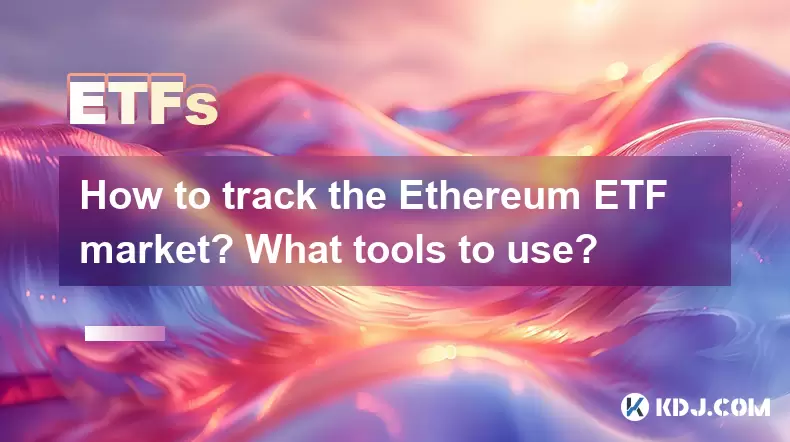
How to track the Ethereum ETF market? What tools to use?
May 15,2025 at 07:43pm
Introduction to Ethereum ETFsEthereum Exchange Traded Funds (ETFs) provide investors with an opportunity to gain exposure to the price movements of Ethereum without the need to directly purchase and store the cryptocurrency. Understanding the market dynamics of Ethereum ETFs is crucial for investors looking to capitalize on the potential growth of Ether...

Can Ethereum ETF hedge risks? How to operate?
May 15,2025 at 07:14pm
Introduction to Ethereum ETFsEthereum Exchange Traded Funds (ETFs) are investment vehicles that track the price of Ethereum, the second-largest cryptocurrency by market capitalization. These funds allow investors to gain exposure to Ethereum without the need to directly purchase and store the cryptocurrency. Ethereum ETFs can be a useful tool for hedgin...
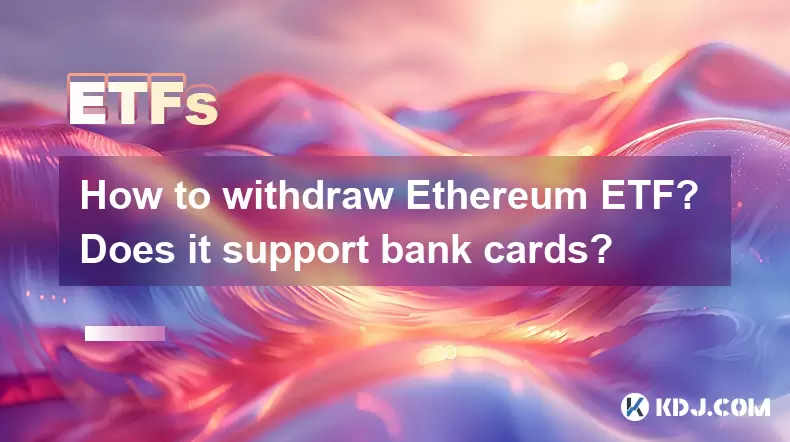
How to withdraw Ethereum ETF? Does it support bank cards?
May 15,2025 at 11:49am
Withdrawing Ethereum from an Ethereum ETF (Exchange Traded Fund) involves a series of steps that vary depending on the platform or broker you are using. Ethereum ETFs are financial products that track the price of Ethereum, and they are typically traded on traditional stock exchanges. In this article, we will explore the process of withdrawing Ethereum ...
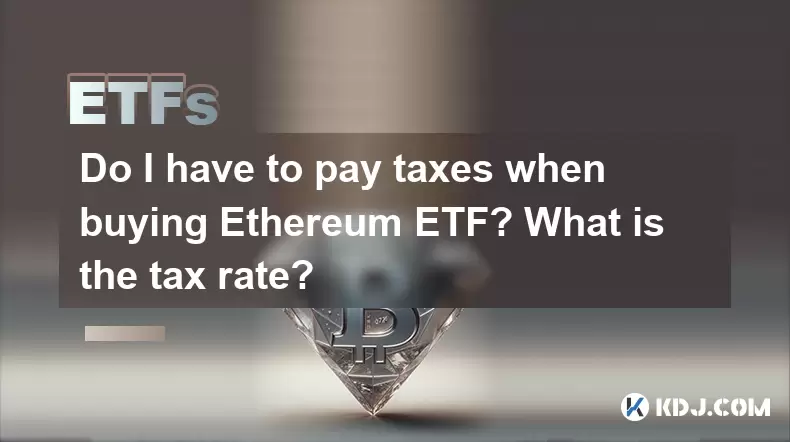
Do I have to pay taxes when buying Ethereum ETF? What is the tax rate?
May 16,2025 at 02:36pm
When considering the purchase of an Ethereum Exchange Traded Fund (ETF), it's essential to understand the tax implications associated with such investments. Ethereum ETFs are subject to taxation, but the specifics can vary based on your country of residence and the type of transactions you engage in. This article will delve into the tax considerations f...
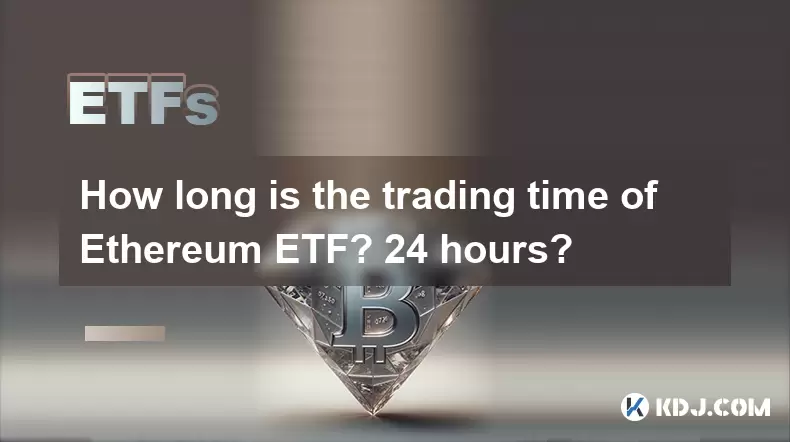
How long is the trading time of Ethereum ETF? 24 hours?
May 16,2025 at 12:01am
How long is the trading time of Ethereum ETF? 24 hours? Understanding the trading hours of an Ethereum Exchange Traded Fund (ETF) is crucial for investors looking to engage with this financial instrument. Unlike traditional stock markets, which have fixed trading hours, the trading time of an Ethereum ETF can vary depending on the specific product and t...
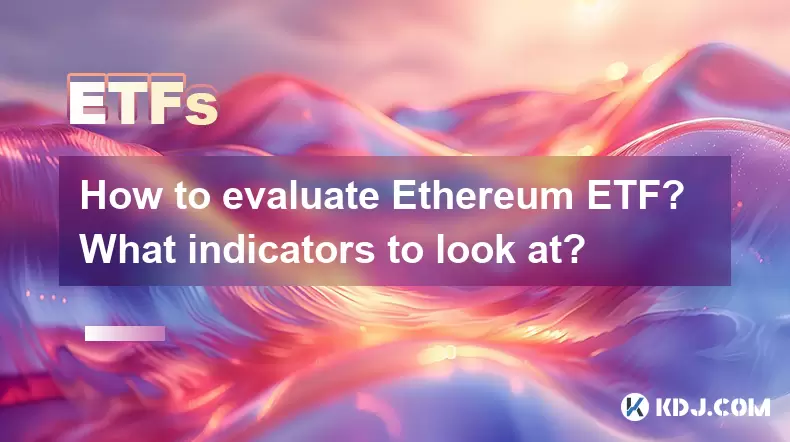
How to evaluate Ethereum ETF? What indicators to look at?
May 15,2025 at 10:00pm
Evaluating an Ethereum ETF (Exchange Traded Fund) involves a comprehensive analysis of various indicators that can provide insights into the fund's performance, risks, and potential returns. Ethereum, as a leading cryptocurrency, has attracted significant attention in the financial world, leading to the development of ETFs that track its price. To effec...

How to track the Ethereum ETF market? What tools to use?
May 15,2025 at 07:43pm
Introduction to Ethereum ETFsEthereum Exchange Traded Funds (ETFs) provide investors with an opportunity to gain exposure to the price movements of Ethereum without the need to directly purchase and store the cryptocurrency. Understanding the market dynamics of Ethereum ETFs is crucial for investors looking to capitalize on the potential growth of Ether...

Can Ethereum ETF hedge risks? How to operate?
May 15,2025 at 07:14pm
Introduction to Ethereum ETFsEthereum Exchange Traded Funds (ETFs) are investment vehicles that track the price of Ethereum, the second-largest cryptocurrency by market capitalization. These funds allow investors to gain exposure to Ethereum without the need to directly purchase and store the cryptocurrency. Ethereum ETFs can be a useful tool for hedgin...

How to withdraw Ethereum ETF? Does it support bank cards?
May 15,2025 at 11:49am
Withdrawing Ethereum from an Ethereum ETF (Exchange Traded Fund) involves a series of steps that vary depending on the platform or broker you are using. Ethereum ETFs are financial products that track the price of Ethereum, and they are typically traded on traditional stock exchanges. In this article, we will explore the process of withdrawing Ethereum ...

Do I have to pay taxes when buying Ethereum ETF? What is the tax rate?
May 16,2025 at 02:36pm
When considering the purchase of an Ethereum Exchange Traded Fund (ETF), it's essential to understand the tax implications associated with such investments. Ethereum ETFs are subject to taxation, but the specifics can vary based on your country of residence and the type of transactions you engage in. This article will delve into the tax considerations f...

How long is the trading time of Ethereum ETF? 24 hours?
May 16,2025 at 12:01am
How long is the trading time of Ethereum ETF? 24 hours? Understanding the trading hours of an Ethereum Exchange Traded Fund (ETF) is crucial for investors looking to engage with this financial instrument. Unlike traditional stock markets, which have fixed trading hours, the trading time of an Ethereum ETF can vary depending on the specific product and t...

How to evaluate Ethereum ETF? What indicators to look at?
May 15,2025 at 10:00pm
Evaluating an Ethereum ETF (Exchange Traded Fund) involves a comprehensive analysis of various indicators that can provide insights into the fund's performance, risks, and potential returns. Ethereum, as a leading cryptocurrency, has attracted significant attention in the financial world, leading to the development of ETFs that track its price. To effec...
See all articles

























